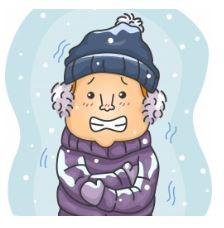
Are people allergic to cold weather the way they are pollen?
While doing research on cryolipolysis, a technique that selectively freezes areas of bodies to “sculpt” them (seriously), I discovered that a disqualifying factor for participants was an allergy to cold, more precisely termed an “allegic/inflammatory reaction to cold.”
If this is real, there are a lot of implications. Banning winter may need to be on the table
Is It Legitimate?
An “allergy” to the cold, or cold urticaria, is apparently real, at least real enough that there are medical websites talking about it. Mild symptoms include hives and swelling upon exposure to cold and worsening of the condition as the skin warms up. In rare cases people with this condition have reportedly gone into anaphylaxis due to cold temperatures. Like other allergies, cold triggers an immune response that activates mast cells and triggers the release of histamine.
There is a problem. No one knows the physical or chemical mechanism. However, the reaction is reproducible in some patients affected by this condition via exposure to ambient cold temperature, or contact with cold substances. For instance, one clinical test used is placing an ice cube on the patient and observing a reaction at the site. It has been reported that those afflicted even show an allergic response to cold food and beverages.
Because no one knows the physical or biological mechanism, cold urticaria has been said to be acquired during one’s life-course secondary to other diseases, but it is otherwise idiopathic, meaning we don’t know why people come down with this.
It is incredibly rare.
While scientists are willing to agree that the condition exists, the Mayo Clinic states that perhaps 0.05% of the population has the condition. If so, that's not rare, that’s over 1.5 million people. Without the data, and they don't list any, I’m not buying it is that common. Even odder, in about half the people who acquire cold urticaria, symptoms retreat after 5 years.
Implications
In a culture where it is proposed we should all stop drinking milk because some of us are lactose intolerant, let's think through the implications of an allergy to cold.
Obviously we can’t really ban winter, but reactions to cold urticaria can be treated with medications used for other allergies. And if there is an obscure, ill-defined malady someone out there will get a grant to work on more specialized treatments. There are currently 16 entries in clinicaltrials.gov for drugs that treat this condition, even lacking understanding of its biological premise, so people that do experience these symptoms may find some relief.
Some of these drugs are being designed such that they can be taken preemptively, when a person is aware they will be exposed to cold. They won't do anything at all to keep you warm, though.



